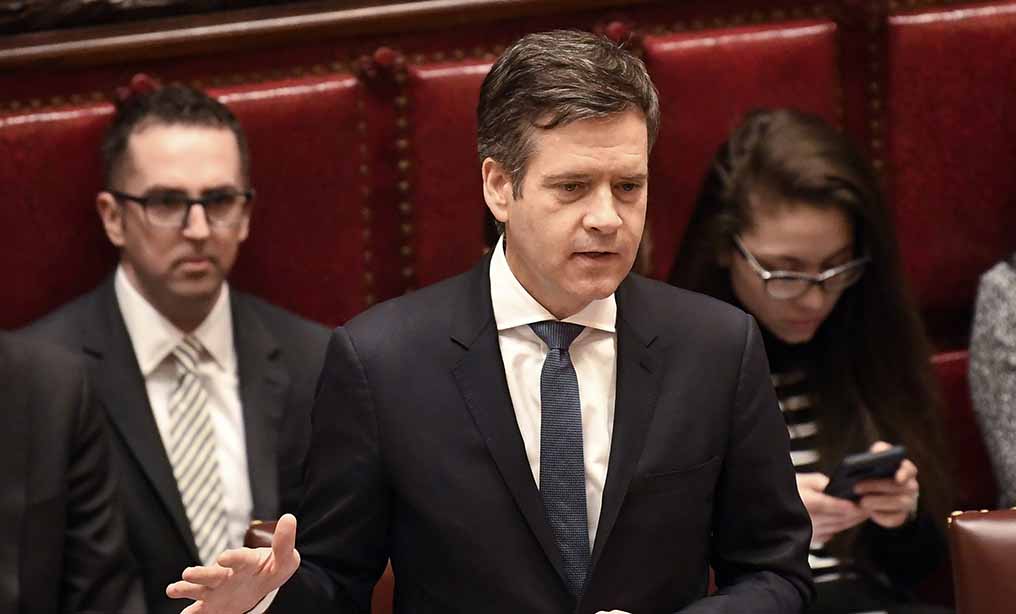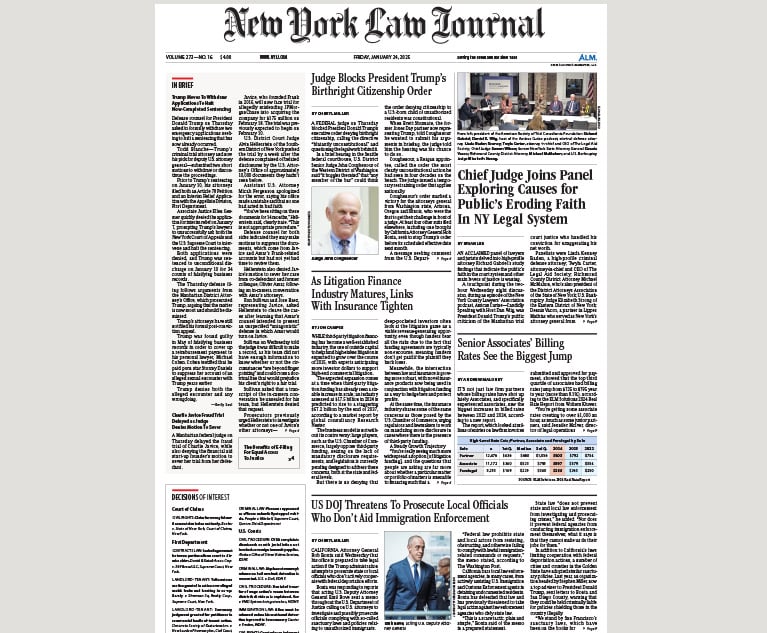New York Lawmakers Decline Chance to Extend 'Look-Back Window' in Child Victims Act
Even with lawyer advertising and press coverage of the CVA, many potential plaintiffs still haven't learned about the law or decided to come forward, an attorney said.
April 07, 2020 at 12:38 PM
5 minute read
 New York State Sen. Brad Hoylman. Photo: Hans Pennink/AP
New York State Sen. Brad Hoylman. Photo: Hans Pennink/AP
State lawmakers took a pass last week on extending a one-year legal window that allowed survivors of child sex abuse to sue over decades-old allegations.
The Child Victims Act, enacted last year, opened up the time frame for victims of child sexual abuse to file lawsuits over claims that were previously barred from court due to the statute of limitations.
The legal window is set to close in August, but New York's court system is no longer accepting CVA lawsuits under new restrictions spurred by the deadly coronavirus pandemic. The state's court system has postponed all "nonessential" services and the CVA lawsuits were not listed as essential under an order from Lawrence Marks, the state's chief administrative judge.
Those orders have effectively placed a hold on new litigation under the act, but the Legislature did not move to lengthen the so-called look-back window in the state budget, which is the keystone legislative package of the year in Albany and is often used as a vehicle for large non-fiscal policy measures.
The coronavirus crisis has upended normal business at the Capitol, but legislative leaders have said they need to continue their work in some fashion. It remains unclear whether legislators will greenlight an extension to the CVA later on this session.
Melissa DeRosa, secretary to the governor, said April 4 there was no conversation about an extension to the legal window in budget talks. She also mentioned lawmakers have the ability to vote remotely.
"So if there's something that we need to revisit and they're not able to come back, it's always on the table," she said.
At the same press conference, Gov. Andrew Cuomo said the legislative session was "effectively over." He hedged the comments by saying it will be up to the Legislature to decide.
State Sen. Brad Hoylman, D-Manhattan, on Monday told the Law Journal the state Senate raised the CVA extension in budget negotiations and it was discussed. But, he said the extension was rejected at some point.
Cuomo last month paused the state's statute of limitations through an executive order, tolling "any specific time limit for the commencement, filing, or service of any legal action, notice, motion, or other process or proceeding."
Hoylman said some people believe the order would apply to the one-year legal window.
But he argued the executive order is unclear in regard to the CVA. Even if the order does apply, he said, it could become a legal question that defendants try to use to their advantage in court.
"It wasn't written with the [CVA] in mind, specifically," said Hoylman, who has argued the order effectively ended the CVA look back window.
In any case, the Manhattan Democrat said victims deserve more time to file their lawsuits, particularly due to the upheaval brought by the coronavirus pandemic.
For the Marsh Law Firm, which represents about 700 people with potential CVA claims, of which some 150 to 200 have actually sued, the pandemic is especially frustrating because a long stay on CVA cases in New York City was lifted in February, just before the crisis struck. Discovery was set to move forward quickly, but is now on hold for 90 days, said Jennifer Freeman, senior counsel at the firm.
James Marsh, a partner at the firm, said the firm believes that Cuomo's tolling of statutes of limitations has extended the deadline to file cases through Sept. 14, from Aug. 14, and said subsequent tolling could push it out further. Still, Freeman said she believes legislators still need to act to extend the CVA window into 2021, saying other states have longer time frames to sue.
While one defendant, Rockefeller University, is engaged in settlement talks, others are holding off, Freeman said.
Even with lawyer advertising and press coverage of the CVA, many potential plaintiffs still haven't learned about the law or decided to come forward, she added. The pandemic has been a particularly hard time for many of them, causing them to "retreat internally" instead of deciding to come forward with their stories.
In the meantime, she said, health risks are mounting for the firm's aging CVA clients, one of whom has already died and another of whom has a stage-four cancer.
READ MORE:
Hundreds of Child Victim Suits Filed in NY; Lawyers Say It's Just Beginning
Wave of Abuse Lawsuits Under New Child Victims Act Is Expected to Crest in NY
This content has been archived. It is available through our partners, LexisNexis® and Bloomberg Law.
To view this content, please continue to their sites.
Not a Lexis Subscriber?
Subscribe Now
Not a Bloomberg Law Subscriber?
Subscribe Now
NOT FOR REPRINT
© 2025 ALM Global, LLC, All Rights Reserved. Request academic re-use from www.copyright.com. All other uses, submit a request to [email protected]. For more information visit Asset & Logo Licensing.
You Might Like
View All
Paul Hastings, Recruiting From Davis Polk, Adds Capital Markets Attorney
3 minute read
Neighboring States Have Either Passed or Proposed Climate Superfund Laws—Is Pennsylvania Next?
7 minute readTrending Stories
- 1New York-Based Skadden Team Joins White & Case Group in Mexico City for Citigroup Demerger
- 2No Two Wildfires Alike: Lawyers Take Different Legal Strategies in California
- 3Poop-Themed Dog Toy OK as Parody, but Still Tarnished Jack Daniel’s Brand, Court Says
- 4Meet the New President of NY's Association of Trial Court Jurists
- 5Lawyers' Phones Are Ringing: What Should Employers Do If ICE Raids Their Business?
Who Got The Work
J. Brugh Lower of Gibbons has entered an appearance for industrial equipment supplier Devco Corporation in a pending trademark infringement lawsuit. The suit, accusing the defendant of selling knock-off Graco products, was filed Dec. 18 in New Jersey District Court by Rivkin Radler on behalf of Graco Inc. and Graco Minnesota. The case, assigned to U.S. District Judge Zahid N. Quraishi, is 3:24-cv-11294, Graco Inc. et al v. Devco Corporation.
Who Got The Work
Rebecca Maller-Stein and Kent A. Yalowitz of Arnold & Porter Kaye Scholer have entered their appearances for Hanaco Venture Capital and its executives, Lior Prosor and David Frankel, in a pending securities lawsuit. The action, filed on Dec. 24 in New York Southern District Court by Zell, Aron & Co. on behalf of Goldeneye Advisors, accuses the defendants of negligently and fraudulently managing the plaintiff's $1 million investment. The case, assigned to U.S. District Judge Vernon S. Broderick, is 1:24-cv-09918, Goldeneye Advisors, LLC v. Hanaco Venture Capital, Ltd. et al.
Who Got The Work
Attorneys from A&O Shearman has stepped in as defense counsel for Toronto-Dominion Bank and other defendants in a pending securities class action. The suit, filed Dec. 11 in New York Southern District Court by Bleichmar Fonti & Auld, accuses the defendants of concealing the bank's 'pervasive' deficiencies in regards to its compliance with the Bank Secrecy Act and the quality of its anti-money laundering controls. The case, assigned to U.S. District Judge Arun Subramanian, is 1:24-cv-09445, Gonzalez v. The Toronto-Dominion Bank et al.
Who Got The Work
Crown Castle International, a Pennsylvania company providing shared communications infrastructure, has turned to Luke D. Wolf of Gordon Rees Scully Mansukhani to fend off a pending breach-of-contract lawsuit. The court action, filed Nov. 25 in Michigan Eastern District Court by Hooper Hathaway PC on behalf of The Town Residences LLC, accuses Crown Castle of failing to transfer approximately $30,000 in utility payments from T-Mobile in breach of a roof-top lease and assignment agreement. The case, assigned to U.S. District Judge Susan K. Declercq, is 2:24-cv-13131, The Town Residences LLC v. T-Mobile US, Inc. et al.
Who Got The Work
Wilfred P. Coronato and Daniel M. Schwartz of McCarter & English have stepped in as defense counsel to Electrolux Home Products Inc. in a pending product liability lawsuit. The court action, filed Nov. 26 in New York Eastern District Court by Poulos Lopiccolo PC and Nagel Rice LLP on behalf of David Stern, alleges that the defendant's refrigerators’ drawers and shelving repeatedly break and fall apart within months after purchase. The case, assigned to U.S. District Judge Joan M. Azrack, is 2:24-cv-08204, Stern v. Electrolux Home Products, Inc.
Featured Firms
Law Offices of Gary Martin Hays & Associates, P.C.
(470) 294-1674
Law Offices of Mark E. Salomone
(857) 444-6468
Smith & Hassler
(713) 739-1250








